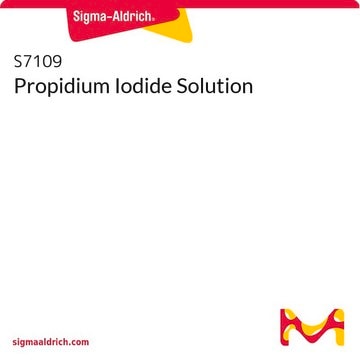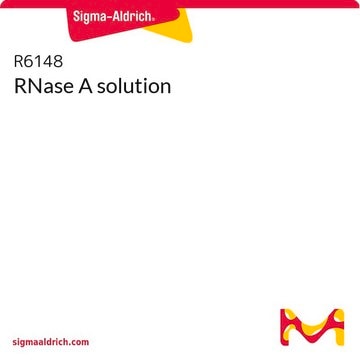P4864
Propidium iodide solution
≥94% purity, solution (1.0 mg/ml in water)
Synonym(s):
3,8-Diamino-5-(3-diethylaminopropyl)-6-phenylphenanthridinium iodide methiodide, 3,8-Diamino-5-[3-(diethylmethylammonio)propyl]-6-phenylphenanthridinium, diiodide
About This Item
Recommended Products
product name
Propidium iodide solution,
Assay
≥94%
Quality Level
form
liquid
color
faint orange to very dark orange, and Faint Red to Very Dark Red and Faint Purple to Very Dark Purple and Orange-Red and Red-Orange
solubility
water: 1 mg/mL
εmax
5400-6400 at 491-495 nm in phosphate buffer
application(s)
diagnostic assay manufacturing
hematology
histology
storage temp.
2-8°C
SMILES string
[I-].[I-].CC[N+](C)(CC)CCC[n+]1c(-c2ccccc2)c3cc(N)ccc3c4ccc(N)cc14
InChI
1S/C27H33N4.2HI/c1-4-31(3,5-2)17-9-16-30-26-19-22(29)13-15-24(26)23-14-12-21(28)18-25(23)27(30)20-10-7-6-8-11-20;;/h6-8,10-15,18-19,29H,4-5,9,16-17,28H2,1-3H3;2*1H/q+1;;/p-1
InChI key
XJMOSONTPMZWPB-UHFFFAOYSA-M
Looking for similar products? Visit Product Comparison Guide
General description
Application
- in staining DNA
- in the viability staining method to study islet viability
- to visualize F-actins and nuclei in mesenchymal stem cell sheets
related product
Storage Class Code
12 - Non Combustible Liquids
WGK
WGK 1
Flash Point(F)
Not applicable
Flash Point(C)
Not applicable
Personal Protective Equipment
Choose from one of the most recent versions:
Certificates of Analysis (COA)
Don't see the Right Version?
If you require a particular version, you can look up a specific certificate by the Lot or Batch number.
Already Own This Product?
Find documentation for the products that you have recently purchased in the Document Library.
Customers Also Viewed
Articles
Cell based assays for cell proliferation (BrdU, MTT, WST1), cell viability and cytotoxicity experiments for applications in cancer, neuroscience and stem cell research.
Cell based assays for cell proliferation (BrdU, MTT, WST1), cell viability and cytotoxicity experiments for applications in cancer, neuroscience and stem cell research.
Cell based assays for cell proliferation (BrdU, MTT, WST1), cell viability and cytotoxicity experiments for applications in cancer, neuroscience and stem cell research.
Cell based assays for cell proliferation (BrdU, MTT, WST1), cell viability and cytotoxicity experiments for applications in cancer, neuroscience and stem cell research.
Related Content
Nancy-520 for DNA Detection and Quantitation
Three-dimensional (3D) printing of biological tissue is rapidly becoming an integral part of tissue engineering.
Three-dimensional (3D) printing of biological tissue is rapidly becoming an integral part of tissue engineering.
Three-dimensional (3D) printing of biological tissue is rapidly becoming an integral part of tissue engineering.
Our team of scientists has experience in all areas of research including Life Science, Material Science, Chemical Synthesis, Chromatography, Analytical and many others.
Contact Technical Service









